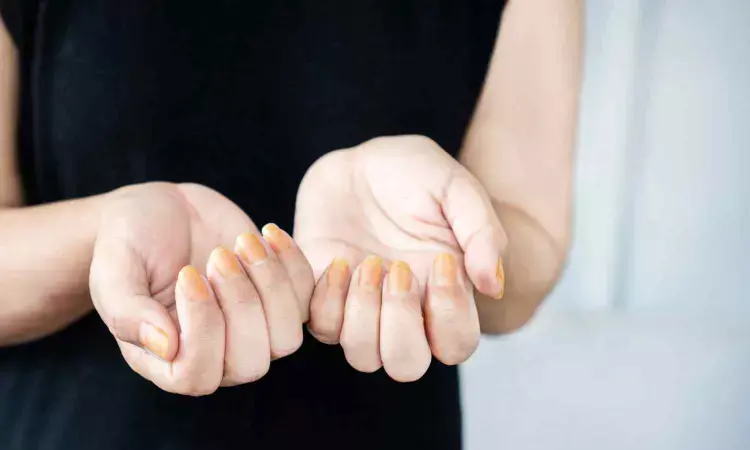- Home
- Medical news & Guidelines
- Anesthesiology
- Cardiology and CTVS
- Critical Care
- Dentistry
- Dermatology
- Diabetes and Endocrinology
- ENT
- Gastroenterology
- Medicine
- Nephrology
- Neurology
- Obstretics-Gynaecology
- Oncology
- Ophthalmology
- Orthopaedics
- Pediatrics-Neonatology
- Psychiatry
- Pulmonology
- Radiology
- Surgery
- Urology
- Laboratory Medicine
- Diet
- Nursing
- Paramedical
- Physiotherapy
- Health news
- Fact Check
- Bone Health Fact Check
- Brain Health Fact Check
- Cancer Related Fact Check
- Child Care Fact Check
- Dental and oral health fact check
- Diabetes and metabolic health fact check
- Diet and Nutrition Fact Check
- Eye and ENT Care Fact Check
- Fitness fact check
- Gut health fact check
- Heart health fact check
- Kidney health fact check
- Medical education fact check
- Men's health fact check
- Respiratory fact check
- Skin and hair care fact check
- Vaccine and Immunization fact check
- Women's health fact check
- AYUSH
- State News
- Andaman and Nicobar Islands
- Andhra Pradesh
- Arunachal Pradesh
- Assam
- Bihar
- Chandigarh
- Chattisgarh
- Dadra and Nagar Haveli
- Daman and Diu
- Delhi
- Goa
- Gujarat
- Haryana
- Himachal Pradesh
- Jammu & Kashmir
- Jharkhand
- Karnataka
- Kerala
- Ladakh
- Lakshadweep
- Madhya Pradesh
- Maharashtra
- Manipur
- Meghalaya
- Mizoram
- Nagaland
- Odisha
- Puducherry
- Punjab
- Rajasthan
- Sikkim
- Tamil Nadu
- Telangana
- Tripura
- Uttar Pradesh
- Uttrakhand
- West Bengal
- Medical Education
- Industry
Study identifies genetic cause for yellow nail syndrome

An analysis of genetic sequencing data and gene and protein expression studies from patients with yellow nail syndrome (YNS) found that defects in the planar cell polarity (PCP) pathway play a significant role in the pathogenesis of YNS. According to the authors, this is the first demonstration of a mechanism explaining YNS development, especially in its congenital form. This study is published in Annals of Internal Medicine.
YNS is a rare disease characterized by the triad of yellow dystrophic nails, lymphedema, and chronic lung disease. The cause of YNS remains largely unknown, although some evidence points to lymphatic vessel development defects as a manifestation of the disease. The genetic cause of YNS, whether congenital or late-onset, remains unknown.
Researchers from the Genetics Institute and Genomics Center, Tel Aviv Sourasky Medical Center and colleagues studied genetic data from six patients with congenital YNS (cYNS) and five with sporadic YNS (sYNS) to determine the genetic mechanisms underlying the disease. Among the patients with cYNS, their first symptoms appeared prenatally or shortly after birth.
The median age for onset of symptoms for those with sYNS was 12 years. Yellow nails and lung disease were the presenting symptoms in most patients with YNS. The researchers examined next generation sequencing data for all patients with YNS to identify and analyze genetic variants. CELSR1 was highlighted as the principal candidate disease-causing gene with autosomal recessive inheritance. The researchers found that all but one patient with cYNS had biallelic variants in CELSR1.
The remaining patient had a heterozygous loss-of-function variant in FZD6. Both CELSR1 and FZD6 are core molecules in the Wnt/PCP pathway. None of the patients with sYNS had candidate variants in either CELSR1 or FZD6.
The researchers then extracted RNA from all patients to assess the Wnt/PCP pathway expression, and found that the pathway is disrupted both in cYNS patients with genetic variants and, to a lesser degree, in sYNS patients without genetic defects. These results suggest a strong case for the involvement of Wnt/PCP signaling and PCP defects in the pathogenesis of YNS.
Reference:
Alina Kurolap, Chofit Chai Gadot, Impaired Wnt/Planar Cell Polarity Signaling in Yellow Nail Syndrome, Annals of Internal Medicine, https://doi.org/10.7326/ANNALS-24-01101
Dr Kamal Kant Kohli-MBBS, DTCD- a chest specialist with more than 30 years of practice and a flair for writing clinical articles, Dr Kamal Kant Kohli joined Medical Dialogues as a Chief Editor of Medical News. Besides writing articles, as an editor, he proofreads and verifies all the medical content published on Medical Dialogues including those coming from journals, studies,medical conferences,guidelines etc. Email: drkohli@medicaldialogues.in. Contact no. 011-43720751


